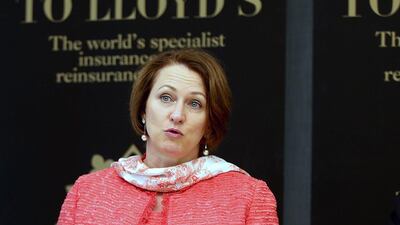Lloyd’s of London, the world’s oldest insurance market, is banking on economic growth in the Middle East, the construction boom and the low insurance penetration rate to help boost its gross premiums in the region from the current level of 2 per cent, its chief executive said.
“What we are trying to do is at least match the GDP growth in mature markets and insurance growth in emerging markets. That’s the sort of target we have,” said Inga Beale during the inauguration of the company’s Dubai office.
The speciality insurance and reinsurance firm is said to have started three centuries ago from a coffee shop and is renowned for insuring anything from ships to coffee tasters’ tongues.
Out of Lloyd’s US$40.7 billion gross written premium in 2013, the share of the Middle East was just $840m, or about 2.1 per cent.
Lloyd’s optimism in the non-life insurance business is supported by industry forecasts.
The insurance industry in the Arabian Gulf region is projected to grow at a compounded annual growth rate of 18 per cent between 2012 and 2017 to reach $37.5bn, with the non-life segment settling at $35.1bn, according to a 2013 report by Dubai-based investment bank Alpen Capital.
Direct premiums in the Middle East’s non-life insurance market are forecast to grow by 6 per cent this year from 1.8 per cent last year, according to Swiss Re, the world’s second largest reinsurer.
The bulk of policies written in the region are for the energy sector, but insurance for construction, political risk and marine are also in demand. The hub status of Dubai and the regulatory environment of the Dubai Financial Services Authority, the regulator of the Dubai International Financial Centre where Lloyd’s office is based, were attractive to the insurer market.
“With the infrastructure growth that’s going on in the region, construction insurance sits behind that and that’s exactly Lloyd’s sweet spot in terms of underwriting expertise,” said Ms Beale.
“Some of Lloyd’s businesses may see it [Dubai] as a hub to write business from all across Africa. Some of them may even use it as a base for south Asia.”
Currently there are more than $4.8 trillion worth of projects in the Middle East and North Africa region, based on estimates by the data provider Meed Projects.
The expansion into Dubai is part and parcel of implementing Vision 2025, a strategy based on Lloyd’s spreading its wings into new geographies and diversifying its insurance product lines, with the introduction of offerings such as cyber security insurance.
“We have been around for three centuries, but the world is changing rapidly now and what we are seeing is that traditionally a lot of the specialist insurance business that Lloyd’s writes used to go to the London market. But that is history,” said Ms Beale, the market’s first female chief executive.
“If you start to look now across the world, much more business is staying in the region, whether it’s in Asia, Latin America or the Middle East. There is a dramatic change in the way business is underwritten.”
Seven out of the nine businesses that are trading in the DIFC will operate from Lloyd’s new platform.
The DIFC-based Visionary Underwriting Agency, one of nine Lloyd’s coverholders, is bullish that the new office will help to boost business. Coverholders allow Lloyd’s syndicates to operate in a region or country as if they were a local insurer.
“Certainly the fact that Lloyd’s has come brings a certain density to the skills for core classes and that will lead to a lot more business being retained locally by the brokers,” said David Austin, Visionary’s chief executive.
dalsaadi@thenational.ae

